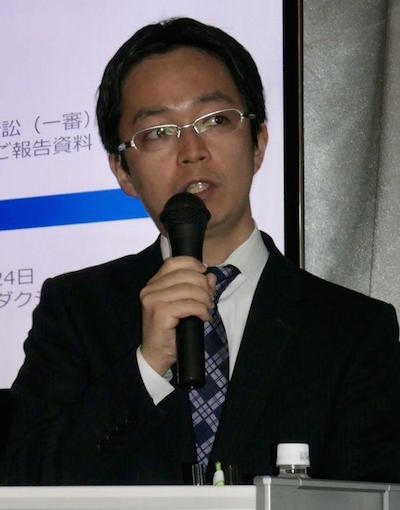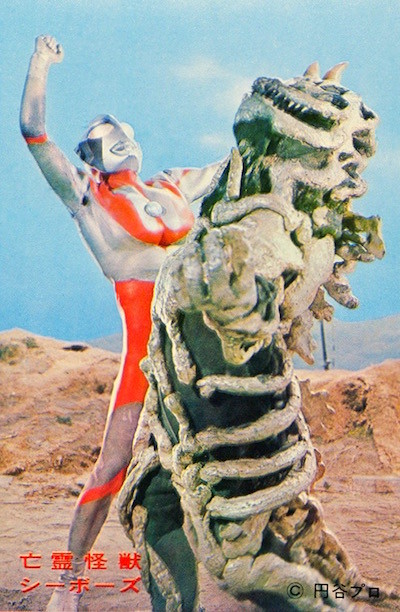円谷プロ、米国のウルトラマン海外権利訴訟で勝訴!
ULTRA SCOOP: Almost as if it were some kind of "Ultra Kismet," after this past weekend's Shout! Factory TV/Twitch marathon of the 1974 ULTRAMAN LEO series, in association with Tsuburaya Productions, whose business manager, Ryota Takahashi, staged a press conference on April 24th, in which the Tokyo-based company announced the final verdict in the recent legal showdown over the on-going "Ultraman" franchise licensing dispute had been rendered by a California Federal Court declaring an alleged contract held by a Thai businessman as null and void (read more from TPC's US attorney, here). Tsuburaya Productions summarily published an English press release on their own website at 10:00 pm PDT:

Corporate attorney Masanobu Hara at the press conference.
NOTICE OF WINNING JUDGEMENT IN U.S. LAWSUIT REGARDING “ULTRAMAN” RIGHTS
In the copyright-related lawsuit that took place in the United States between Tsuburaya Productions Co., Ltd. (“TPC”) and UM Corporation (“UMC”), the United States District Court, Central District of California, entered a final judgment on April 18, 2018 affirming the entire claim of TPC, including that the supposed agreement dated March 4, 1976, claimed by UMC as the basis for its alleged rights in “Ultraman,” was not an authentic contract.
In addition to confirming that TPC possesses all the rights to develop and expand any audio-visual or other creative works or products based on “Ultraman” characters or stories, the judgment required UMC to pay damages for its infringement of TPC’s rights.
1. Court and Date of Judgment Given
U.S. District Court, Central District of California
April 18, 2018 (local time)
2. Developments Thus Far
On May 18, 2015, UMC filed a lawsuit against TPC in the above court, seeking confirmation of its alleged rights to use the “Ultraman” series and characters created by TPC. On September 11, 2015, TPC filed a countersuit against UMC and its licensees to confirm TPC’s exclusive worldwide rights in “Ultraman” and to recover damages from UMC and its licensees for their infringements.
In support of its assertion of rights, UMC claimed that there was an agreement signed in 1976 (the “Document”) by Noboru Tsuburaya, who was the representative of TPC, which gave Mr. Sompote Saengduenchai, a Thai businessman, rights to use and exploit “Ultraman” worldwide, excluding Japan, and that UMC had succeeded to Mr. Sompote’s alleged rights.
TPC asserted that the Document was a forgery, such that UMC had no rights to use “Ultraman,” and that UMC infringed TPC’s copyrights by doing so. Therefore, the principal point of dispute in this lawsuit was whether the Document was an authentic contract signed and sealed by Noboru Tsuburaya, or whether it was forged.
The dispute between TPC, UMC and Mr. Sompote has continued for more than 20 years. The background of the dispute is as follows.
In 1996, the year after Noboru Tsuburaya passed away, Mr. Sompote suddenly presented to TPC a copy of the Document that was supposedly signed by Noboru Tsuburaya in 1976, and claimed that he possessed in perpetuity the right to use the “Ultraman” series worldwide excluding Japan. The Document presented by Mr. Sompote was a mere one-page document, and the original was not disclosed.
There were many misstatements in the Document regarding basic matters that would never have been made, had Noboru Tsuburaya actually prepared the Document, such as errors in TPC’s company name and the names and episode numbers of the works of the “Ultraman” series. In addition, specific licensing fees were not provided, and there were no provisions for matters that would certainly be provided in genuine licensing agreements.
Additionally, during the 20-year period between 1976, when the Document was supposedly prepared, and 1996, the year after Noboru Tsuburaya died when it was first presented to TPC, Mr. Sompote had not exercised his alleged rights based on the Document, nor referenced the existence of the Document even once.
During this 20-year period, Mr. Sompote never developed a global business for the “Ultraman” series, as he later asserted he was entitled to do.
On the other hand, even after 1976, including while Noboru Tsuburaya was the representative of TPC, TPC made considerable investments to produce and globally distribute the “Ultraman” series and build an international brand. In response to those activities, neither Mr. Sompote nor anyone affiliated with him ever claimed the existence of the Document or Mr. Sompote’s alleged rights.
Based on such facts and others, TPC firmly believed that the Document was a forgery, and it has therefore been in dispute with Mr. Sompote and UMC. Whether or not the Document was forged has been disputed in the courts of Japan, Thailand and China in the past.
In Japan, TPC requested a handwriting analysis by the court regarding the Document, but an analysis was not conducted, and a decision that the Document was an authentic document was therefore rendered without a confirmation of the original Document being made.
In Thailand, handwriting analysis procedures were conducted, and, as a result thereof, the TPC’s claim of forgery was recognized and TPC won the lawsuit. In Thailand, the forgery of the Document was not only decided in a civil case, but also became a criminal case, and Mr. Sompote was convicted of forgery.
In China, while TPC won the lawsuit in the first instance, the judgment was reversed at the higher court so it would be consistent with the judgment from Japan.
In the Chinese and Japanese judgments, it was recognized that the Document, even if not a forgery, granted only limited rights to use “Ultraman” works from the early-Showa era series (mid 1960s to mid 1970s). In the judgments of all of the countries, it has been recognized that, regardless of the outcome of the lawsuits, the copyrights in “Ultraman” belong to TPC.
3. U.S. Judgment
In the lawsuit in the U.S., enormous amounts of documents, materials and communications that both parties had in their possession were disclosed and analyzed over a long period of time through a procedure called “discovery,” which was not available to the parties in any of the other lawsuits.
As a result thereof, new facts and evidence, which had not become apparent in the lawsuits in each of the other countries, were revealed.In addition, depositions (testimonies conducted under oath before trial) and witness examinations of numerous witnesses from both parties and of handwriting analysis expert witnesses were conducted.
Furthermore, Mr. Sompote, who is the alleged recipient of, and the only living alleged witness to the creation of, the Document, refused to accept service of the complaint for the U.S. lawsuit without reason, and refused to appear in court as a witness.
In November 2017, a trial was held before a jury of 8 members of the community. On November 20, 2017, the jury returned a unanimous verdict in favor of TPC on its claim that the Document was not an authentic or valid contract that had been signed and sealed by Noboru Tsuburaya.
After the jury reached its verdict, UMC filed motions to try to overturn the verdict on the grounds that it had been reached through error and was not supported by evidence. On March 28, 2018, the district court denied UMC’s motions and maintained the jury’s verdict.
On April 18, 2018, the district court entered a Final Judgment which, consistent with the jury’s verdict, states that the Document is not an authentic agreement that was signed and sealed by Noboru Tsuburaya, and that the Document is invalid, and which prohibits UMC and its licensees from using “Ultraman.”
We believe this victory in the U.S. lawsuit solidifies TPC’s decades-long efforts to fully and finally resolve this dispute and confirm its worldwide rights in “Ultraman.”
4. TPC Comments
The above judgment recognizes TPC’s claim in its entirety.
This complete winning judgment was rendered after numerous witness testimonies and analytical opinions of handwriting analysis experts, in addition to the detailed evidentiary disclosure proceedings that lasted a long period of time and required enormous efforts. We believe that the credibility of such judgment is extremely strong. Based on this judgment, TPC intends to actively proceed with the further overseas expansion of the “Ultraman” works.
We are grateful for the continuous supports of all our customers, stakeholders, and fans of the “Ultraman” series.
-End Quote-
And so, our saga comes to an end... Finally, the first six of Tsuburaya Productions' "Ultra Series," ULTRA Q, ULTRAMAN, ULTRA SEVEN, RETURN OF ULTRAMAN, ULTRAMAN ACE, and ULTRAMAN TARO, are truly free to be distributed in North America and beyond!
So, while we might want to shout from the rooftops, perhaps we should cross our fingers, not hold our collective breath, and hope that we don't hear much from Sampote "Sands" Saengduenchai, TIGA International, or UM Corporation ever again.





































